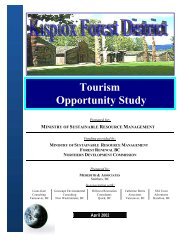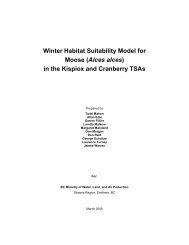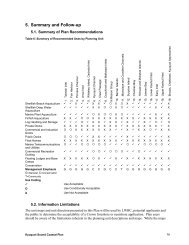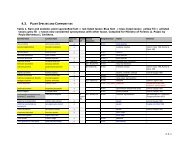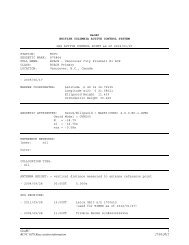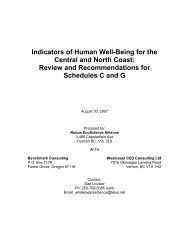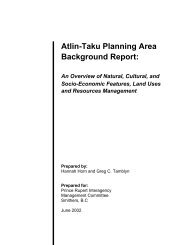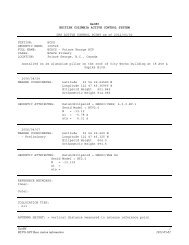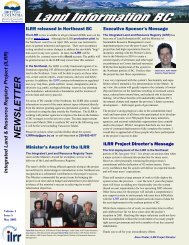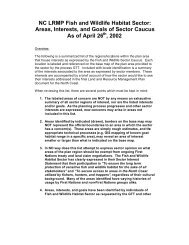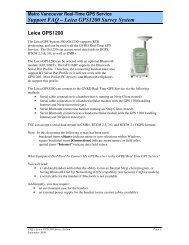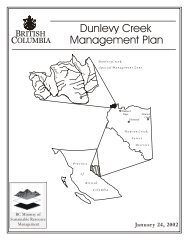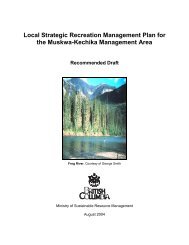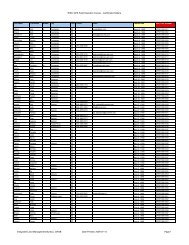Final report - Integrated Land Management Bureau
Final report - Integrated Land Management Bureau
Final report - Integrated Land Management Bureau
Create successful ePaper yourself
Turn your PDF publications into a flip-book with our unique Google optimized e-Paper software.
► Issue: No coastal BC transportation plan exists<br />
Transportation Assessment of the Central & North Coast of BC<br />
There is no overarching transportation strategy for coastal BC. At the BC level<br />
there is a 2003 transportation plan, which is somewhat dated, and makes<br />
reference to only a few coastal BC projects. The BC Ports Strategy, completed<br />
by the Ministry of Small Business and Economic Development and the Ministry<br />
of Transportation in 2005, focused on the province’s major trading ports. It is<br />
our understanding that the Ministry of Transportation and Infrastructure is<br />
presently working on a strategy for BC’s “medium-sized” ports. There is also<br />
the Northern Service Strategy of BC Ferries cited earlier, which is not yet<br />
available to the public, and the BC Ferries’ Service Plan. In addition, the Port<br />
of Prince Rupert likely has a rolling strategy and/or business plan.<br />
While BC lacks a coastal transportation plan, several good examples exist,<br />
including the Southeast Alaska Transportation Plan produced by the Alaska<br />
Department of Transportation. 59 This is directly relevant to the North and<br />
Central Coast because the Alaska Panhandle has the same type of high reliance<br />
on ferries, in combination with a few roads and air services, albeit a more<br />
populous area.<br />
The North Coast and Central Coast LRMP and government-to-government<br />
negotiations on land and resource use plans are examples of where First<br />
Nations and the BC Government have jointly participated in collaborative<br />
planning endeavours. These strategies and plans are piecemeal but they are<br />
undertaken in their own silos for the most part and do not feature synergies<br />
between communities, industries and transportation modes. Coordinating<br />
resources -- whether money, skill or knowledge -- in the transportation area<br />
will be important in coastal BC, where there is not the margin for error that<br />
exists in large metropolitan areas.<br />
Good transportation links have historically played a fundamental role in the<br />
economic and social wellbeing of coastal BC. However, the economy of the<br />
region has undergone major structural change in recent years with the<br />
downsizing of the coastal forest industry, re-structuring and consolidation in<br />
the fishing industry, emergence of nature-based tourism featuring fly-in lodges,<br />
resurgence of large cruise ship tourism, the attempt by BC Ferries to find a<br />
private sector operator for its northern routes, land use plans providing for<br />
many more new protected areas and Ecosystem Based <strong>Management</strong>, and the<br />
diversification and re-positioning of Port of Prince Rupert. In addition, there<br />
are community-based changes with First Nation communities seeking new<br />
economic endeavours and partnerships led by a new generation of leadership.<br />
A collaborative, multi-stakeholder transportation strategy-making initiative<br />
focused on coastal BC would allow for a dialogue and sharing of information<br />
59 Available at<br />
http://www.dot.state.ak.us/stwdplng/projectinfo/ser/newwave/SATP_FINAL/assets/<strong>Final</strong>SATP.pdf<br />
Chisholm Consulting 79



